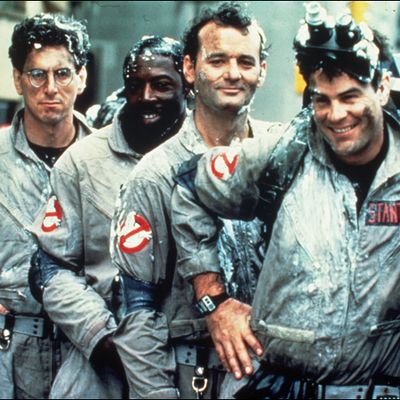
Remember that time when Hollywood made a not-particularly-inspired 1995 remake of the Audrey Hepburn film Sabrina, and then destroyed all copies of the classic 1954 original so it could never be seen again? No? Then how about the the time Gus Van Sant did his┬ákind-of-weird-but-okay shot-for-shot homage to Psycho, thus ensuring that every human being born after 1998 would nevermore have knowledge of, nor access to, the Hitchcock original? DoesnÔÇÖt ring a bell? In that case, you may not be overly panicked,┬álet alone apoplectic, about the prospect of an all-female installment of┬áGhostbusters┬áÔÇö an intriguing possibility floated earlier this week, when┬áit was reported that Sony has discussed just such a project┬áwith director Paul Feig.
Some people, however, did panic. Never mind that an all-female Ghostbusters would provide a great opportunity for exactly the kind of ensemble comedy that filmgoers of late┬áreally seem to like. Never mind that it would likely involve Melissa McCarthy, who is arguably the biggest comedy star, male or female, in the world right now. And never mind that an all-female ensemble would, at the very least, spare us the infinitely more fraught possibility of watching a contemporary male film comedian try to fill Bill MurrayÔÇÖs Peter VenkmanÔÇôsize shoes. (Somewhere, I have to imagine, Vince Vaughn is exhaling an enormous sigh of relief at a bullet dodged.)
It might sound like IÔÇÖm treating the all-female Ghostbusters like some kind of novelty gimmick, and thatÔÇÖs because I am, because novelty gimmicks are awesome. I love this idea not only because it sounds like a huge amount of fun, but because I love, as a whole, reboots, remakes, sequels, retreads, reconsiderations, reimaginings, and even ill-considered po-mo deconstructions. You may think we already have too many of these. I think we need way more of them.
ItÔÇÖs become an article of pop-culture faith that we must roll our eyes and rend our garments at the increasing sequelization and rebootification of Hollywood. And itÔÇÖs definitely the case that, mostly thanks to budgetary concerns and marketing jitters, movie studios and producers are ever more eager to wring every drop of entertainment from the properties they already own, rather than run the risk of floating something new.
For those who hold dear the beloved classics of yesteryear, such as Ghostbusters, this reboot mania can cause some reflexive agita. It shouldnÔÇÖt. First of all, the original, classic Ghostbusters will eternally be available for viewing, and should withstand even the most inept reboot, let alone one as creatively promising as Feig is suggesting. Star Wars is still, and will always be, Star Wars, despite the addition of the phrase ÔÇ£A New HopeÔÇØ and the unfortunate existence of Jar Jar Binks. (Digitally fussing with an existing movie, however, is a whole other unforgivable transgression and should be actively condemned, if not outlawed.)
Personally, IÔÇÖd love to see an all-female Ghostbusters. IÔÇÖd also love to see a Ghostbusters set in Victorian England, with everyone in top hats and waistcoats. For that matter, I would love to see a steampunk Ghostbusters. Or a comedy-horror hybrid┬áGhostbusters set aboard a space station orbiting Mars. Or one directed by Harmony Korine.
When Disney acquired the creative rights to the Star Wars universe from George Lucas, there was much consternation among the loyal Star Wars fanbase about who exactly would be entrusted with this hallowed franchise and how exactly they would manage to fuck it up. One solution was to worry about this endlessly. The other solution is more radical and far more implausible: Make Star Wars open-source.
It would never happen, of course, but how cool would it have been if Disney had opened the bidding on Star Wars movies, and let any interested party license a small chunk of the universe? IÔÇÖm certainly psyched for a Rian Johnson Star Wars film ÔÇö┬ábut IÔÇÖd be just as psyched for a small indie film that follows the early life of Nien Nunb on some far-off satellite planet, directed by Kelly Reichardt. Or a quiet, witty, Star WarsÔÇôthemed social comedy helmed by Nicole Holofcener. Maybe she has no interest at all in Star Wars. Fair enough. How about a sharply observed, bittersweet Ghostbusters film instead? Seriously, wouldnÔÇÖt you like to see what the director of Enough Said could do with Peter Venkman, Dana Barrett, Slimer, and that insanely gorgeous New York apartment Dana inhabited?
If we really believe movies like Ghostbusters are classics, then hell, letÔÇÖs treat them like classics and reboot them in every single way we can possibly imagine. Shakespeare ÔÇö┬áthe very definition of a classic! ÔÇö can serve here as the model. Every Shakespearean play has been remounted so many times that, by now, itÔÇÖs essentially impossible to do one of them straight-up. As a result, the most interesting new productions ÔÇö whether itÔÇÖs Richard III set in pre-Fascist Europe┬áor Macbeth as a pulpy horror-noir┬áor Much Ado About Nothing as a spry contemporary rom-com ÔÇö┬áare all reimaginings. TheyÔÇÖre Shakespeare reboots. Not all of them work, but all are interesting, some are fantastic, and a few even enhance our understanding of the original material in complex and worthwhile ways.
In related news, Jane AustenÔÇÖs Emma can survive giving birth to Clueless. One of the most promising TV shows on the horizon is FoxÔÇÖs pre-Batman police procedural, Gotham, which, seen from one angle, can look like a last shake of of the piggybank to see if another coin falls out. From another angle, though, itÔÇÖs a chance to dig elbows-deep into an existing narrative treasure-trove in a manner of which even Tom Stoppard might approve.
Our cultural mythologies exist not to be venerated and preserved in amber, but to be played with, reconstituted, reconsidered, dismantled, dissected, and stripped for parts. This is what fan-fiction writers, cosplay advocates, and disciples of T.S. Eliot already understand: If itÔÇÖs good enough for Hamlet, itÔÇÖs good enough for Peter Venkman. Or, to misquote, mishandle, appropriate, reimagine, and repurpose Chairman Mao: Let a thousand reboots rebloom.

